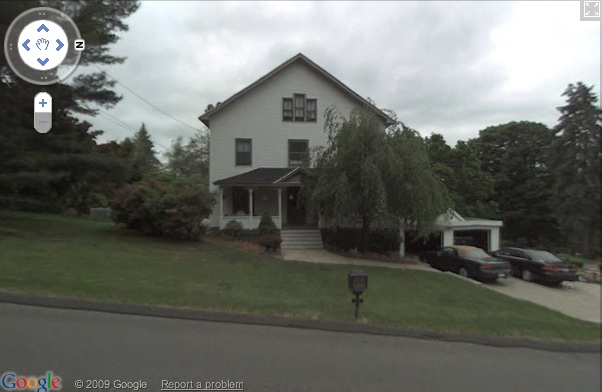 This is the house I was born into. It doesn’t look the same, but then, neither do I.There were gates and a sidewalk leading up to the front porch from the street. A railing on the garage top to keep us–who weren’t supposed to be up there–from falling off.
This is the house I was born into. It doesn’t look the same, but then, neither do I.There were gates and a sidewalk leading up to the front porch from the street. A railing on the garage top to keep us–who weren’t supposed to be up there–from falling off.
It was the house my grandfather and grandmother bought some time after coming here from Poland in the early nineteen-hundreds. They lived on the first floor, along with my Aunt Olga and her husband, my Uncle Connie and their two daughters, both younger than I. We lived on the second floor, my mom and dad and two older sisters and I. There were only two bedrooms, so the three girls shared one room. I remember that my bed was against a set of glass pocket doors that led into my parents’ bedroom. I remember before that, when I slept in a crib within their room.
The kitchen was red tiled floor with cheery white curtains at the windows. There was a porch where my mother hung the clothes out on the line. I played army with the clothespins. Downstairs, there was a huge shared hallway. A flight of stairs up to the second floor started with a post with a big round ball on top. That was Peter. John, the other post, was upstairs in our apartment.In the attic was a little room we used to hide in from my mother. And, a laundry chute down to the bathroom where we used to peek in on my oldest sister.
It was a great setup, just the four rooms around a cluster of pantry and bathroom in the center. If my mother was after me I could run fast enough around the rooms to get a lead and jump into the bathroom and lock the door. If we clomped our feet hard enough as we ran, or cried loud enough, my babcia would come upstairs and complain (and save me!). This made my mom soooo mad.
I remember walking down the hill to the little store for groceries. The one at the corner of Derby Avenue. Mrs. Fitol was mean, it seemed to me, but she spoke broken English, like my grandparents. I didn’t know till I was older that she’d come outside and watch till we got safely home again.
I remember walking up the hill where my Uncle Windy and Aunt Elizabeth lived, and where her (and my mother’s) two bachelor brothers lived as well. Between here and there was where my kindergarten boyfriend lived. And the girl I sometimes played with lived right next door. Across the street was Mrs. Burr, who had a goldfish pond outside her scary looking mansion.
In the backyard–well, it was a double back yard, since it held a garden and many fruit trees and ran all the way down to my Uncle Louie’s house, my father’s brother. The only other relatives that didn’t live in Derby, or within this neighborhood, were my Uncle Frankie and his family in Portchester, NY, and my Aunt Stepha and her family in New Haven. These were day trips, made on holidays.
When I was ten, my parents bought their first home. It was across the street and up the hill from my grandfather’s, just above Mrs. Burr’s. They did a lot of work both on the inside and the outside. The house cost them $14,000.
Since then, there are two more houses built between my grandfather’s house and my Uncle Louie’s. And the house is no longer in the family since my cousin died. And now, there are two more houses between my father’s house and Mrs. Burr’s.
I think of all these things, try to remember all the good times and the people. Today, eight years ago, my mother died.








 The Lost Children: A Charity Anthology
The Lost Children: A Charity Anthology